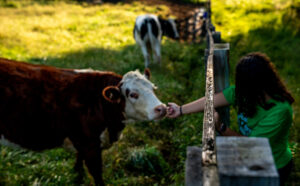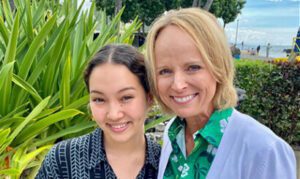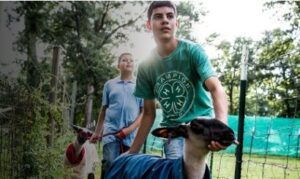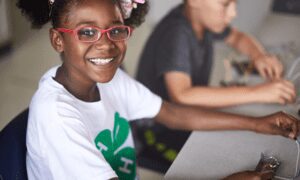
When various and nuanced logistical challenges made it clear that a successful 2020 poultry sale would be challenging, Lenah started to brainstorm different ways to harness the chicken-rearing energies of the Feathered Friends, Fauquier County’s 4‑H poultry club. The more she researched, the more the idea for a service project started to form. She reached out to Sharon Ames, the executive director at the Fauquier Food Bank. The county’s food insecurity statistics — at just under 6 percent — are fairly low compared to some counties in the state, yet in 2016 there were still more than 4,000 Fauquier residents seeking food assistance. Sharon estimated her food bank, the only one in the county, regularly served 100 to 150 clients, five days a week. And though they always had enough food to meet that demand, items with high-quality protein were few and far between. Adolescents and adults are advised to eat around 5-6.5 ounces of protein a day. One large egg, which is equivalent to a serving size, is an excellent source of both protein and essential vitamins and minerals — meaning that donations of eggs and chicken would be much appreciated.
Knowing the local need was there, Lenah then reached out to Emily and Duane Lawrence, the volunteer 4‑H leaders of Feathered Friends, to discuss transforming their usual livestock project into a service project. The adults all agreed it was a great idea, but they were concerned the kids might feel differently. At a poultry sale, youth could expect to walk away with some amount of money in exchange for their hard work — maybe even more money than the animals were worth. However, despite the potential monetary lure, none of the club members ‘bawked’ at the idea of a service project.
“They felt excited about donating,” Emily says. “It wasn’t an obstacle—it was an added incentive.”
“It’s exciting for a larger group of kids to be working toward one goal and sharing that experience at the same time,” Lenah adds. “Learning life skills and the responsibility of caring for living things. I think they feel empowered that they have the capability to address situations and problems in their own communities.”
Interest continued to grow, and support poured in from across the area. Community members donated a closet full of egg cartons to be distributed to participants so they could safely deliver their eggs. The Northern Piedmont Community Foundation provided funding to purchase chicks and the feed needed to sustain them through October 2020. By January, Lenah had 30 Fauquier County 4‑H-ers committed to the project. Each of them would receive either 10 layers or 10 broilers.
“We anticipated that the kids would each donate about 90 dozen eggs per week to the food bank starting at the beginning of June, and 60 whole chickens in mid-July,” Lenah says.
That was the plan, anyway, but by March the full impact of COVID-19 was becoming clearer. On March 23, the temporary closure of the state’s public schools had been extended through the end of the school year. Within a week, Governor Northam had issued a statewide stay-at-home order intended to mitigate the spread of the virus. In the month that followed, unemployment claims in Fauquier County increased dramatically—and not long after, Sharon Ames estimates, the number of clients at the Fauquier Food Bank had doubled.
“Some of them might not have experienced [food insecurity] before,” she says. “Especially the families with kids who are dealing with school being closed or losing a job.”
By that point, the Feathered Friends had not even received their first chicks. Yet knowing the impact the project was expected to make pre-COVID-19, Lenah started looking for ways to increase their contribution to meet rising demand. In response to closures, the club took the chicks from the local schools’ embryology demonstrations into their flocks.
“My own kids really recognized the need,” Emily Lawrence says. “They’ve seen free lunch pick-ups. They see that they’re able to contribute something to help. They think, ‘I’m going to be contributing these eggs … and the eggs will go on and on.’ They’re a part of that impact every day.”
At the beginning of May, Lenah reached out to the PATH Foundation, a local grant-making organization. PATH ended up making a $10,500 donation to help expand the project. With that additional money, Lenah was able to increase the participants to 46 youth (six of them brand new to 4‑H), bringing the total anticipated egg donation to 2,780 dozen (for those doing the math, that’s more than 33,000 eggs!). Working with Sarah Bullard, the county Youth Livestock Educator, she also used the funds to add 854 pounds of meat to the donations by purchasing and processing animals from 4‑H participants at the county livestock show and sale.
With that increase in yield, PATH advised her to spread the food donations out where the need was heaviest in the county. Lenah reached out to two smaller food pantries, and they made immediate use of the new donations. Community Cooks was able to use beef donations to make grab-n-go meals, like taco salad and spaghetti carbonara, available to anyone who needed them. And the Rappahannock Food Pantry, which was two days away from running out of meat, was able to replenish its supply. By the end of July, Fauquier Reaches for Excellence in School Health (FRESH) will include donated eggs in Weekend Power Packs for kids on free and reduced lunch. The packs will also include produce from the Fauquier Education Farm and a recipe featuring all the included ingredients.
And the work will continue. Even though Feathered Friends club members are only required to donate their eggs to the project up until November, when the funding for their feed ends, Lenah has already heard from many families that they intend to continue their efforts, proving that service does come first for these 4‑H-ers.
Feathered Friends members, both new and seasoned, really appreciate the impact they’re making. Xander Ronzio, age 10, has been a part of the club since he was a Cloverbud. “I like the project because it is fun and I get to take care of chickens,” Xander says. “It is nice to donate eggs to the food bank, because there are people who need food.” A mother of another participant noted that there are unintended benefits, too. Because he is eager to learn more about chickens and how to best care for them, her son is reading more.
Building on enthusiasm like that, in May Lenah hosted a webinar for other state Extension offices, providing guidance on how the project was structured and best practices. Representatives from 20 Virginia counties attended the training, along with several interested community members. Since then, Lenah has heard that three other counties are hatching poultry service projects of their own.
Over the last few months, as the realities of COVID-19 social impacts have grown clearer, Lenah has seen how fortuitous the decision to shift the poultry project proved to be. “It makes me really happy to know that people in need are getting good-quality food — not just some lunchmeat on white bread,” Lenah says. “It has been an awesome project for this weird time, as it can still be done while social distancing, and it fulfills a critical need.”
And the impacts of all of Lenah’s efforts continue to ripple outward, reflecting the important role that 4‑H agents play, not only in the lives of youth, but in their counties. The community has rallied around this project with 4‑H at its heart. Most recently, Lenah has been having conversations about providing laying-hens to a local childcare group for a virtual learning program they are developing. The eggs produced will be donated too, getting a lot more youth engaged in 4‑H and in the service project.
“What an incredible thing they are doing for our community,” says Kirsten Dueck, a senior program officer with the PATH Foundation. “These young farmers saved the day. I thank them and [Lenah] from the bottom of my heart for making this a reality.”
Feathered Friends, Fauquier County’s 4‑H poultry club





















